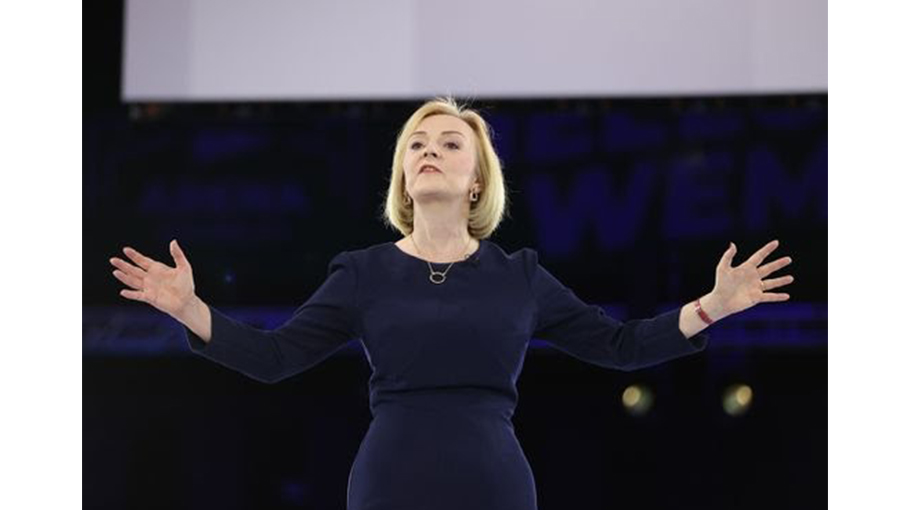Truss starts on a crisis note her prime ministership

In the 10 days of national mourning in the United Kingdom that followed the death of Queen Elizabeth, all government business was put on hold.
And that’s a good thing. Because in the 10 days that have followed, the government of new Prime Minister Liz Truss has managed to shred Britain’s financial reputation, sink the pound to its lowest level — ever — against the dollar, saddle future generations with billions of pounds in debt, earn a stinging rebuke from the International Monetary Fund, and have Conservative MPs considering writing letters of no confidence to their party chairman to potentially replace their leader of a little more than three weeks.
Oh, and set the opposition Labour party up to be the government in waiting.
So, overall, a pretty depressing, calamitous, feckless 10 days. Oh, and as things stand now, it’s two years to that general election. That’s if the sky doesn’t fall, Britain goes bankrupt, or the IMF moves in to manage the finances of what is beginning to look more and more like an emerging-market economy.
Even before the latest self-inflicted economic meltdown, opinion polls had Labour 17 points ahead of Truss’ Conservatives.
Advantage Labour
I haven’t seen new polling but I would think that when those figures do come, that present 41 to 24 per cent lead in favour of Labour could very well be close to 50 to 20 — if the Tories are lucky. Don’t quote me on those exact figures — they could very well be worse — but should be at the 25 per cent mark.
Regular readers of this column might remember that I cited the recent example of Kim Campbell, the rookie Prime Minister who oversaw the 1993 electoral implosion of Canada’s Conservatives — fiscal management and the economy was the main reason. Yep, the more I think about this mess, the more I see parallels.
You know things are bad when the Labour party is being feted by business leaders and bankers for its sound and reasonable economic policies right now. History would tell us the Labour Party has traditionally been a party of big government, spending broadly, taxing widely, nationalising, running the economy on socialist rather than business principles.
Economics would tell us that offering tax cuts to the richest 1 per cent on the UK, paying £180 billion to subsidise the energy bills of all, and funding it all through a nebulous policy of unfettered borrowing, is a course for disaster — particularly at a time when inflation is rampant and the economy is on the verge of recession.
And politics? Politics would tell us that this is a Prime Minister determined to make a bold statement with the old, grey and wealthy few who selected her as party leader on September 5.
Oh, and politics would tell us that this is a reckless course. That the PM needs to govern for every Briton, that there is a responsibility to look after the public purse — a legal fiduciary duty even.
Is it any wonder some UK Tory MPs are
already saying that their party now needs
a period in opposition to regroup.
It could very well be a long time out in the cold
Legal? Well, yes. But then this is a Conservative party that believes it’s morally right to rip up international treaties such as the Brexit agreement, before the ink is even dry, on the excuse that well, the agreement we agreed to wasn’t really what we meant, so it doesn’t matter anyway.
Shattered finances
Shredded reputations. The IMF issuing warnings. A plunging currency. A debt pit. This is the UK we’re talking about here. Not some Third World banana republic. But the UK, you know, with a veto on the UN Security Council.
How is that for a PM that was officially appointed two days before the Queen’s death.
And so what of Labour?
Since he came to lead the party two years ago, Sir Keir Starmer has faced criticism from elements within his ranks that he lacks charisma, that he’s rigid, unwilling to bend, lacking that spark that will attract voters.
Oh, and isn’t that such a wonderful thing right now.
He is exactly the type of leader Labour needs right now. So too Britain. Solid. Dependable. Reliable. Sensible. Considered. Unswayed.
As the former head of the Crown Prosecution Services in the UK, Sir Keir knows full well that evidence wins cases. Not bluster. Not rhetoric. The overwhelming weight of evidence speaks for itself.
So what now of the case of the People against Truss and Others?
The charges are that Kwasi Kwarteng and Truss wilfully attempted to destroy the finances and long-term stability of the UK economy, did undermine and wilfully undervalue the pound sterling, and did aid and abet the enrichment of those least in need through inequitable financial inducements.
The evidence is in every chart that reflects the market chaos of these past days. It is in the statements of the IMF. Of Moodys — the credit rating agency. From Janet Yellen of the US Federal Reserve. In the withdrawn mortgage offers that have wrecked the hopes and dreams of couples trying to get on the property ladder. In the conversions on foreign currency transactions of every Brit using a bank or credit card abroad. In the strained finances of post-Brexit companies in Britain still managing to do business beyond those self-controlled borders.
The verdict? Well, that will come in the next general election.
In this case, the jury has made up its mind. Is it any wonder some UK Tory MPs are already saying that their party now needs a period in opposition to regroup. It could very well be a long time out in the cold.



